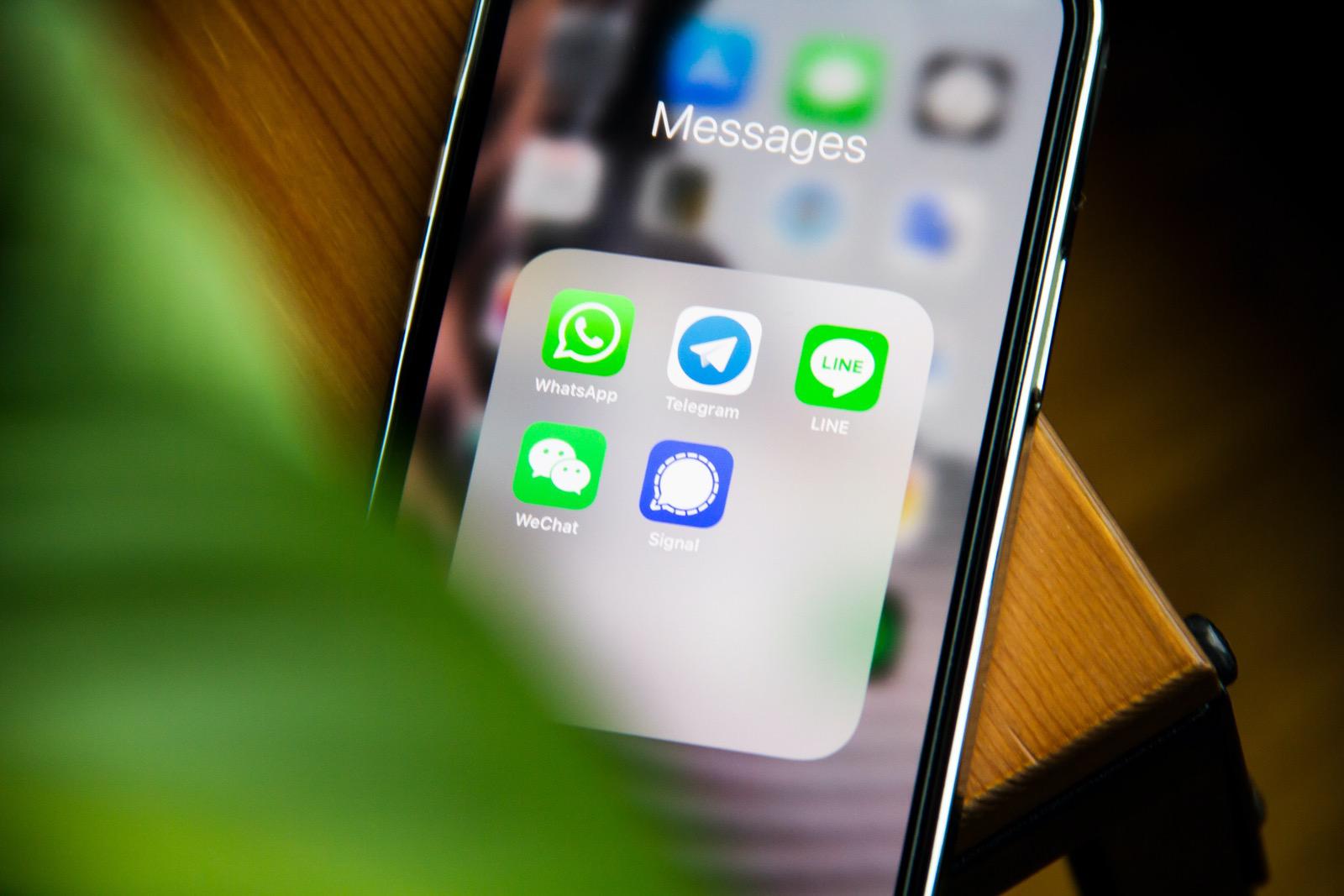- What Are Social Messaging Apps
- Why Should You Use Social Messaging Apps
- What Are the Advantages of Social Messaging Apps
- Most Popular Social Messaging Apps
Social messaging apps provide a private, instant, and direct line of communication on social media. In business, this is very advantageous as it supports a personalized and intimate style of communication.
Most, if not all, social networks have built-in direct messaging features. However, their capabilities and functions vary greatly. Some are ideal for sharing user-generated content, while others are well-suited for customer service.
To help you navigate the ever-growing world of social messaging apps, we’re going to delve into the most popular social messaging apps in this guide. We’re also going to explain why they matter in business.
What Are Social Messaging Apps
The ubiquity of social media has forever changed the way businesses communicate and interact with customers.

Using Twitter, Facebook, or Instagram, you can now reach a large number of people without burning through your marketing budget. You can also have authentic social interactions that affect everything from brand awareness to customer satisfaction.
Social platforms, however, aren’t perfect. They lack the infrastructure to address many business concerns. For instance, Twitter’s 280-character limit might be too short for an actual response to a customer inquiry. You might end up redirecting them from one channel to another, which they might find inconvenient. Plus, the comment sections on social networks are too public.
That’s where social messaging apps come in.
They enable you to send instant and bite-sized communications to your consumers and colleagues. You can use direct messaging to clarify order details and answer complex inquiries. More importantly, you can resolve issues directly with unsatisfied customers—out of the public eye.
Why Should You Use Social Messaging Apps
Messaging apps are important for any modern workforce that doesn’t want to be overwhelmed with lengthy emails. Instead of scheduling hour-long meetings and video conferences, you can simply ask a question in your group chat and get the information you need.

With direct messaging, you can stay in touch with your workforce by sending instant and bite-sized communications. You can save a lot of time and effort.
Here are a few other reasons why social messaging apps matter in business:
- Free to use
- Has billions of active users worldwide
- Customizable
- Private, instant messaging
- Supports multimedia formats
- Supports video and audio calls
What Are the Advantages of Social Messaging Apps
One of the main advantages of using social messaging apps is real-time communication. They serve as a private and direct line to your business.

However, the advantages of social messaging apps go well beyond real-time communication.
Instant file sharing
Social messaging apps can support multimedia formats. Instead of sending files via email, you can share them instantly with your colleagues or customers through a direct message. Whether it be photos or videos, you can send or receive the files you need in a matter of seconds.
Automate customer support
Social messaging apps are valuable to businesses because they can be integrated with chatbots. These bots can be automated and programmed to perform all kinds of tasks. For instance, they can handle first-level support, such as appointment scheduling and customer inquiries.
By streamlining these processes, you can increase conversions. You can also resolve customer inquiries and concerns faster. This can help your customer representatives handle the more complex issues without feeling overwhelmed.
Boost sales
You can use direct messages to share your promotional offers and deals with eligible consumers. When you use direct messaging for marketing, your communications should be personalized and engaging. In doing so, you can make your recipients feel appreciated and valued.
The one-on-one nature of direct messaging can make your marketing message seem more personal and intimate. It should entice your recipients to use the deals and offers you’re presenting.
Protect brand reputation
Your online presence has a huge role in crafting and maintaining your brand reputation. Positive feedback can drive sales, while publicly visible criticisms can negatively impact it.
If consumers share negative feedback on social media, it’s always best to respond publicly. This makes it clear to everyone that you aren’t running from the complaint. Then, you can follow up with a private apology for the inconvenience. Through direct messaging, you can resolve the issue privately and directly with the customers involved.
Build customer loyalty
Aside from sending offers and promotions, you can use direct messaging to reward followers with special content.
You can choose followers who like and comment on nearly every post you publish on social media. They are clearly interested in the brand. You can keep it that way by sending sneak peeks of upcoming products, services, or events. You can also share small gifts like holiday cards, limited discounts and codes.
Most Popular Social Messaging Apps
Alongside social media networks like Facebook, Instagram, and Twitter, there are a number of messaging apps that can help businesses interact with consumers.

Here are some of the most popular apps:
1. WhatsApp
WhatsApp is a social messaging app owned by Facebook with approximately 2 billion users worldwide. Unlike other apps, it isn’t attached to your social platform. Rather, it is based on phone numbers.

In business, you can use WhatsApp to communicate with customers or colleagues. You can add more than 250 people in a group chat. From there, you can share up to 100 megabytes of videos, photos, and other multimedia content. Through WhatsApp pay, you can now even send and receive money from another user.
2. Facebook Messenger
Also owned by Facebook, Messenger is one of the most popular messaging apps in the world. It has around 1.3 billion active users worldwide. It is free to use. When you create a Facebook business profile, you can use the Messenger app.

Messenger is a great channel for answering customer inquiries and sending promotions because it integrates with a chatbot. Instead of hiring customer service representatives, you can use a chatbot to respond to inquiries around the clock. It can assist multiple customers at the same time without being overwhelmed.
Best of all, your chatbot can respond instantly to customer inquiries. They can provide your customers with the answers they need right away.
3. Skype
Skype is a professional messaging app that lets you send messages, make calls, and host video conferences. It has impressive video and audio quality. As long as you have a stable internet connection, you and your team can communicate with each other easily.

More importantly, Skype is secure. You can confidently share files with your contacts in a matter of seconds.
It is compatible with phones, tablets, and computers, making it a convenient way to stay in touch with colleagues who use various devices. Thus, it’s a great option for businesses, particularly ones with a remote workforce.
4. Snapchat
Snapchat is one of the apps that you use to reach a younger audience. It is unique because it relies heavily on visual content. Many businesses leverage this platform to create viral trends and campaigns that can boost the brand’s visibility and reach.

It is also a social messaging app, which lets you send photos and videos to other users. The messages have a 60-second limit. After that time limit, the conversation will be removed permanently. If you make a screenshot of the chats and images, the app will inform the other party.
5. Slack
Slack is a modern social messaging app. It is widely used by tech startup companies because it has the perfect balance between fun and functional.

You can send direct messages with funny emojis, GIFs, and other animations. You can do video and phone calls as well using the app.
Unlike other messaging apps, Slack lets you build public group chats. It’s up to you to decide if you want to make your group conversations public or private. It is also compatible with the business apps you already use, such as Gmail and Outlook.
6. WeChat
WeChat has more than a billion users who are mostly from Asia. If you want to connect with an Asian audience, this app should make it easier for you to reach them.

Perhaps one of the most convenient features of WeChat is that it lets you call landlines and mobile numbers. Even if the person you want to reach doesn’t have the app, you can contact them using the app.
7. Telegram
Telegram might not have a large user base as the rest of the apps on this list; however, it has notable features that are advantageous for businesses. For starters, it is customizable. You can pick a theme and personalize your messages to reflect your brand.

Additionally, it supports stickers and free downloads. It even integrates with chatbots. As mentioned, these bots can make customer support a breeze for your business. By integrating a bot, you can address customer inquiries and concerns faster.
Social messaging apps provide consumers with inherently private and direct lines of communications to businesses. They can also be used to streamline communications and increase the productivity of your workforce. Either way, these apps can help your business grow and flourish simply by making online communications quick and easy for all parties.

